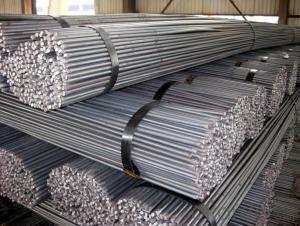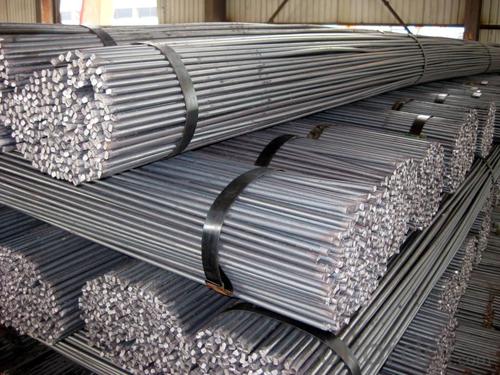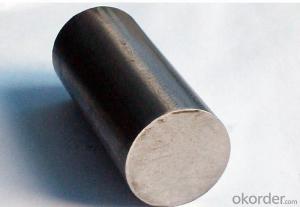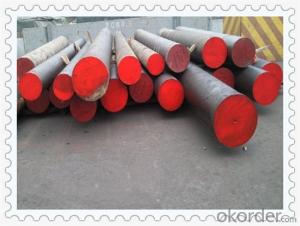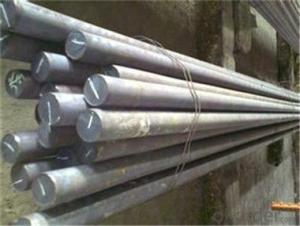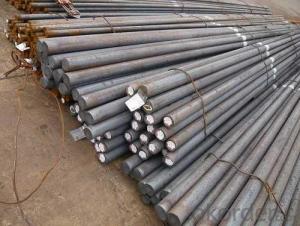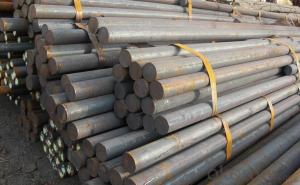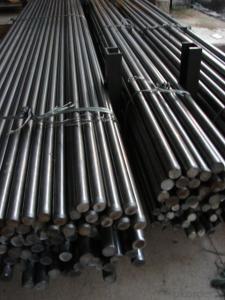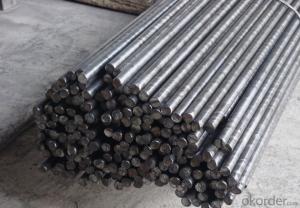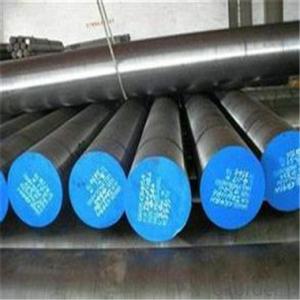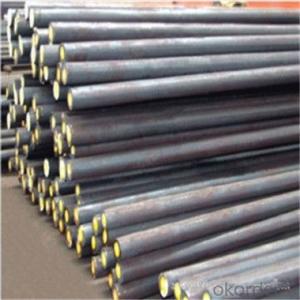GB 45#/SAE 1045 Steel Round Bar 20mm/25mm
- Loading Port:
- China main port
- Payment Terms:
- TT or LC
- Min Order Qty:
- 50 m.t
- Supply Capability:
- 10000 m.t/month
OKorder Service Pledge
OKorder Financial Service
You Might Also Like
GB 45#/SAE 1045 Steel Round Bar 20mm/25mm
Description:
-Specification: 20mm/25mm
-Length: 6m/12m
-Standard: GB/SAE/Japanese Standard
-Material: GB 45#/SAE1045/S45C
Chemical Composition of GB 45#/SAE 1045 Steel Round Bar 20mm/25mm:
| C | Si | Mn | P | S | Ni | Cr | Cu |
| 0.42-0.50 | 0.17-0.37 | 0.50-0.80 | ≤0.035 | ≤0.035 | ≤0.30 | ≤0.25 | ≤0.25 |
Packaging & Delivery of GB 45#/SAE 1045 Steel Round Bar 20mm/25mm:
Packaging Detail: All goods are packed in bundle with steel strips and shipped by break bulk vessel or container (depend on target market and different ports)
Delivery Detail: 45 days
MOQ: 50 tons per specification; we can negotiate the quantity if the specification is normal or we have stock of one specification.
Weight: The price invoicing on theoretical weight basis or actual weight basis depends on customer’s request.
Shipment: The shipment of bulk break or container is depends on customer’s request and the situation of the port of destination.
Documents given: Full set of original clean on board bill of lading; Original signed commercial invoice; Original packing list; Policy of insurance; Certificate of origin and what the target market needs.
Payment:
-Invoicing on theoretical weight or actual weight as customer's request.
-FOB, CFR or CIF.
-Regular terms of payment:
1, 30% payment in advance, the remaining balance (70% payment) against the copy of B/L.
2, 30% payment in advance, the remaining balance (70% L/C) against the copy of B/L.
3, Negotiable.
Images of GB 45#/SAE 1045 Steel Round Bar 20mm/25mm:
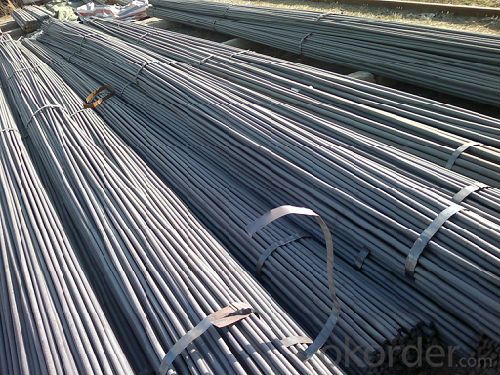
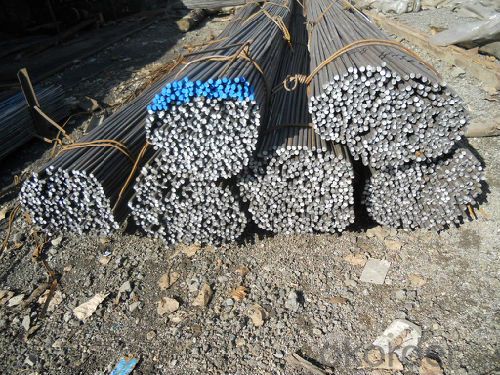
*If you would like to get our price, please inform us the size, standard/material and quantity. Thank you very much for your attention.
- Q: What is the difference between a solid steel round bar and a hollow steel round bar?
- A solid steel round bar is a cylindrical metal rod that has a uniform diameter throughout its entire length. It is made of solid steel, meaning it does not have any hollow or empty space inside. On the other hand, a hollow steel round bar also has a cylindrical shape but contains a hollow or empty space within its center. This hollow space can vary in size, depending on the specific design and purpose of the hollow round bar. The main difference between the two lies in their structural integrity and weight-bearing capacity. A solid steel round bar offers greater strength and stability compared to a hollow steel round bar. This is because the solid bar is made of a continuous steel material, making it more resistant to bending, twisting, or deforming under pressure. It is commonly used in applications where high strength and durability are required, such as construction, engineering, and manufacturing industries. In contrast, a hollow steel round bar may have reduced strength and load-bearing capacity due to the presence of the hollow space within. However, the hollow design provides certain advantages in terms of weight, cost, and flexibility. The hollow space allows for a lighter overall weight of the bar, making it more suitable for applications where weight is a critical factor, such as aerospace or automotive industries. Additionally, the hollow space can be utilized for various purposes, such as passing through electrical wires or fluids, providing a channel for ventilation, or even reducing material costs by using less steel. Ultimately, the choice between a solid steel round bar and a hollow steel round bar depends on the specific requirements of the application. If strength and stability are paramount, a solid bar would be the preferred choice. Conversely, if weight reduction, cost-efficiency, or additional functionality is desired, a hollow bar may be more suitable.
- Q: How are steel round bars used in the manufacturing of fasteners and bolts?
- Steel round bars are used in the manufacturing of fasteners and bolts as they provide the necessary strength and durability required for these components. The bars are typically cut and shaped into the desired length and shape, and then undergo various processes such as threading or heat treatment to enhance their performance. The resulting steel rods are used as the main body of fasteners and bolts, providing the necessary structural integrity and reliability in various industrial applications.
- Q: What is the difference between seamless and welded steel round bars?
- Seamless and welded steel round bars differ primarily in the manufacturing process and the resulting characteristics of the final product. Seamless steel round bars are manufactured by piercing a solid billet of steel to create a hollow tube. This tube is then elongated and further processed to achieve the desired dimensions and surface finish. The seamless manufacturing process ensures that there are no welds or joints along the length of the bar. As a result, seamless steel round bars have a uniform composition and structure throughout, providing excellent strength and reliability. They are often preferred when high pressure or high-temperature applications are involved, as they offer better resistance to internal and external pressure. On the other hand, welded steel round bars are made by joining two or more pieces of steel together through welding techniques. This involves heating the ends of the steel pieces and fusing them together using various welding methods, such as arc welding, resistance welding, or fusion welding. The welding process introduces a weld seam along the length of the bar, which can affect its structural integrity and mechanical properties. Welded steel round bars may have slightly lower strength and toughness compared to seamless bars, as the presence of the weld seam can create stress concentrations. However, they are generally more cost-effective and readily available in a wide range of sizes and grades. In summary, the main difference between seamless and welded steel round bars lies in their manufacturing process and resulting characteristics. Seamless bars are produced by piercing a solid billet, offering uniform composition and strength throughout, making them suitable for high-pressure and high-temperature applications. Welded bars, on the other hand, are created by joining multiple pieces of steel through welding, introducing a weld seam that can slightly affect their strength and toughness. Welded bars are often more cost-effective and readily available in various sizes and grades.
- Q: What is the difference between seamless and welded steel round bars?
- The manufacturing process and resulting characteristics distinguish seamless and welded steel round bars. Seamless bars undergo a process where a solid billet of steel is pierced to form a hollow tube. This tube is then elongated and further processed to achieve the desired dimensions and surface finish. The seamless manufacturing process guarantees a bar without any welds or joints along its length. Consequently, seamless steel round bars possess a uniform composition and structure throughout, ensuring exceptional strength and reliability. They are particularly favored for applications involving high pressure or high temperatures, as they display superior resistance to internal and external pressure. In contrast, welded steel round bars are produced by combining two or more steel pieces through welding techniques. This involves heating the ends of the steel pieces and fusing them together using various welding methods, such as arc welding, resistance welding, or fusion welding. The welding process introduces a weld seam along the length of the bar, which has the potential to impact its structural integrity and mechanical properties. Welded steel round bars may exhibit slightly lower strength and toughness compared to seamless bars due to the presence of the weld seam, which can create stress concentrations. Nonetheless, they are generally more cost-effective and readily available in a wide range of sizes and grades. To summarize, the primary distinction between seamless and welded steel round bars lies in their manufacturing process and resulting characteristics. Seamless bars are created through the piercing of a solid billet, ensuring a uniform composition and strength throughout, which makes them suitable for high-pressure and high-temperature applications. On the other hand, welded bars are formed by joining multiple steel pieces through welding, introducing a weld seam that may slightly affect their strength and toughness. Welded bars are often more cost-effective and available in various sizes and grades.
- Q: What are the advantages of using maraging steel round bars?
- Using maraging steel round bars in various applications offers several benefits. Firstly, these bars possess an impressive strength-to-weight ratio, making them ideal for situations where strength is crucial. They can withstand high stress and load-bearing conditions without deforming or failing, ensuring structural integrity. Secondly, maraging steel round bars exhibit exceptional toughness, enabling them to absorb significant amounts of energy before fracturing. This toughness makes them highly resistant to cracking or breaking, even under extreme conditions, enhancing their durability and reliability. Additionally, maraging steel round bars are known for their outstanding corrosion resistance. Unlike other types of steel, they are less prone to rust and oxidation, making them suitable for use in harsh environments or where exposure to moisture or chemicals is a concern. This corrosion resistance helps extend the lifespan of the bars and reduces maintenance costs. Furthermore, maraging steel round bars are relatively easy to machine, despite their high strength and hardness. They can be easily shaped, drilled, and cut into different forms and sizes, allowing for versatile applications across various industries. This ease of machining saves time and effort during the manufacturing process. Moreover, maraging steel round bars have excellent heat treatability, meaning they can be hardened and tempered to further enhance their mechanical properties. This flexibility in heat treatment allows for customization to meet specific project requirements, such as achieving desired hardness levels or improving characteristics like wear resistance or toughness. Lastly, maraging steel round bars are widely used in the aerospace and defense industries due to their exceptional strength, toughness, and corrosion resistance. They are commonly utilized in the manufacturing of critical components such as landing gear, missile casings, and aircraft structures, where reliability and performance are paramount. In conclusion, the advantages of using maraging steel round bars include high strength, superior toughness, corrosion resistance, machinability, heat treatability, and suitability for aerospace and defense applications. These properties make them the preferred choice for demanding industries, ensuring optimal performance and longevity in critical applications.
- Q: What are the different treatments available for steel round bars?
- Depending on the desired properties and applications, there are several treatment options available for steel round bars. Some commonly used treatments are as follows: 1. Altering the mechanical properties of steel round bars can be achieved through heat treatment. This involves heating the bars to a specific temperature and then cooling them rapidly or slowly. By doing so, hardness, strength, toughness, and resistance to wear and corrosion can be improved. 2. To increase hardness, quenching can be employed. This entails rapidly cooling the heated steel round bars in a liquid medium, such as water or oil. Following quenching, tempering is carried out by reheating the steel to a lower temperature. This reduces brittleness and enhances toughness. 3. Surface hardening is a treatment method used to enhance the hardness of the outer layer of steel round bars while maintaining a tough and ductile core. Common techniques for surface hardening include carburizing, nitriding, and induction hardening. 4. Cold working involves deforming the steel at room temperature through processes like rolling, drawing, or extrusion. This treatment strengthens and increases the hardness of the steel round bars. Additionally, it improves dimensional accuracy and surface finish. 5. To enhance resistance to corrosion and wear, a protective coating can be applied to steel round bars. Zinc plating, galvanizing, and various types of paint or epoxy coatings are commonly used for this purpose. 6. Shot blasting is a treatment technique where small metallic or abrasive particles are shot at high speeds onto the surface of the steel round bars. This process removes contaminants, scale, and rust, resulting in a clean and polished surface. It is important to consider the specific requirements of the steel round bars and the intended application when choosing a treatment method. Consulting with experts or metallurgists is recommended to determine the most suitable treatment for a particular situation.
- Q: Can steel round bars be used in the manufacturing of home decor?
- Yes, steel round bars can be used in the manufacturing of home decor. They are versatile and can be shaped and welded into various forms, making them suitable for creating furniture, sculptures, and other decorative elements for homes.
- Q: What is the tensile strength of a steel round bar?
- The tensile strength of a steel round bar depends on various factors such as the specific grade of steel, the manufacturing process, and any additional treatments or coatings applied. Generally, steel round bars have high tensile strength due to their composition and structural design. The specific tensile strength can vary significantly depending on the grade of steel. For example, low carbon steel typically has a tensile strength of around 400-550 MPa (megapascals), while high carbon steel can have a tensile strength of 700-1000 MPa or even higher. It's worth noting that the tensile strength of a steel round bar can be further enhanced by heat treatment processes such as quenching and tempering, which can significantly increase its strength and hardness. Additionally, certain alloying elements like chromium, nickel, and molybdenum can be added to steel to improve its tensile strength and other mechanical properties. To determine the exact tensile strength of a specific steel round bar, it is crucial to refer to the manufacturer's specifications or consult relevant industry standards such as ASTM (American Society for Testing and Materials) or AISI (American Iron and Steel Institute) standards. These standards provide detailed information on the mechanical properties, including tensile strength, for various grades of steel.
- Q: Can steel round bars be used for making cutlery or kitchen utensils?
- Yes, steel round bars can indeed be used for making cutlery or kitchen utensils. Steel is a popular choice for kitchen utensils due to its strength, durability, and resistance to corrosion. However, the specific type of steel and the production process used will determine its suitability for culinary purposes. Stainless steel, for example, is highly recommended for cutlery and kitchen utensils as it is resistant to rust and stains, easy to clean, and does not react with food. Additionally, steel round bars can be easily shaped and formed into various utensil designs, making them a versatile material for cutlery and kitchenware manufacturing.
- Q: What are the advantages of using nickel-chromium alloy steel round bars?
- Using nickel-chromium alloy steel round bars in various applications offers several benefits. Firstly, these round bars possess outstanding corrosion resistance properties. The inclusion of nickel and chromium elements in the alloy enhances its ability to withstand corrosion from moisture, chemicals, and oxidation, making it suitable for use in challenging environments like marine applications, chemical processing plants, and oil refineries. Secondly, these round bars exhibit high temperature resistance. The combination of nickel and chromium in the alloy allows it to endure elevated temperatures without compromising its structural integrity. This makes them ideal for use in heat exchangers, furnaces, and other high-temperature applications. Furthermore, these round bars boast exceptional mechanical properties. They demonstrate excellent strength, toughness, and wear resistance, making them ideal for applications that require high load-bearing capabilities. Additionally, they exhibit good ductility, enabling easy machining and fabrication. Additionally, these round bars possess good electrical conductivity, making them suitable for electrical and electronic applications where conductivity is crucial, such as in the manufacturing of resistors, heating elements, and electrical connectors. Lastly, these round bars are readily available and cost-effective. Being a widely used material in various industries, they are easily accessible and can be obtained at competitive prices. In conclusion, the advantages of utilizing nickel-chromium alloy steel round bars encompass excellent corrosion resistance, high-temperature resistance, superior mechanical properties, good electrical conductivity, and cost-effectiveness. These characteristics make them the preferred choice for a wide range of applications in industries such as construction, automotive, aerospace, and electrical engineering.
Send your message to us
GB 45#/SAE 1045 Steel Round Bar 20mm/25mm
- Loading Port:
- China main port
- Payment Terms:
- TT or LC
- Min Order Qty:
- 50 m.t
- Supply Capability:
- 10000 m.t/month
OKorder Service Pledge
OKorder Financial Service
Similar products
Hot products
Hot Searches
Related keywords
